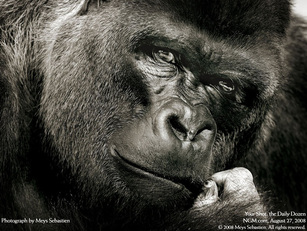
Gorilla
This video contains both misconceptions and biases. In the video, the speaker said, “People who believe in the fairytale of evolution expect you to think that people are really low-down, dirty animals.” This is a misconception because according to http://evolution.berkeley.edu/evolibrary/article/0_0_0/evo_02, “biological evolution, simply put, is descent with modification”. If you examine the two definitions, you can see that they are very different. Based on the Out-of-Africa theory discussed in my A.P. World class, by the second definition, we are examples of evolution. According to the Out-of-Africa theory, we are all derivatives of the species homo sapiens sapiens, not monkeys like the video says. When people moved out of Africa (evolution mechanism of migration), people evolved and changed genetically based on their new environment (mutation). For example, people who moved to places closer to the equator had darker skin than people who moved farther away from the equator. Another misconception I noticed in the video was when the speaker mentioned that the theory of evolution was inaccurate because humans don’t look like animals. (“Man shows no physical characteristics to animals at all.”) According to the video we watched in class (Ian Dunnings), this point is a fallacy. What does looks have to do with anything? Personally, I don’t look like any of my siblings; does that mean that I am not related to them because I don’t look like them? No. The speaker in the video has many misconceptions, supported only by fallacies, that show that he is science illiterate.
Science knowledge is different from other knowledge because science knowledge is obtained through the scientific method. Even though all knowledge helps explain the natural world, science knowledge has 4 requirements that it has to meet in order to classify as scientific knowledge. According to the Biology textbook, the four requirements are as follows:
1. Science is based on the assumption that the natural world can be investigated and explained in terms we can understand.
2. Science is based on the results of observations and controlled experiments.
3. The results of these observations and experiments must be (at least in principle) repeatable and verifiable by other scientists.
4. The findings of science must be refutable.
If knowledge doesn’t meet these qualifications, it does not count as science.
There are definitely consequences in not understanding biological evolution. If you don’t understand biological evolution, that means you are science illiterate in that topic. According to Patino, if you are not science illiterate, you are not able to make informed opinions about things. This video is an example of that. The speaker, who claims that people that believe in evolution are Darwin worshippers against religion, clearly doesn’t understand what evolution is. Due to this ignorance, he made a video that made him look foolish. Along with looking foolish, he has become unaccepting of other views. This situation draws parallels to GMO. Since people don’t understand what GMOs are, they are against it. This resistance is very similar to the speaker’s resistance towards evolution. From my personal experience, I have learned that people are against things that they don’t completely understand. In conclusion, I believe people could strive to have a solid general understanding of things and to be science literate because not understanding science concepts, like evolution, definitely have consequences.
Science knowledge is different from other knowledge because science knowledge is obtained through the scientific method. Even though all knowledge helps explain the natural world, science knowledge has 4 requirements that it has to meet in order to classify as scientific knowledge. According to the Biology textbook, the four requirements are as follows:
1. Science is based on the assumption that the natural world can be investigated and explained in terms we can understand.
2. Science is based on the results of observations and controlled experiments.
3. The results of these observations and experiments must be (at least in principle) repeatable and verifiable by other scientists.
4. The findings of science must be refutable.
If knowledge doesn’t meet these qualifications, it does not count as science.
There are definitely consequences in not understanding biological evolution. If you don’t understand biological evolution, that means you are science illiterate in that topic. According to Patino, if you are not science illiterate, you are not able to make informed opinions about things. This video is an example of that. The speaker, who claims that people that believe in evolution are Darwin worshippers against religion, clearly doesn’t understand what evolution is. Due to this ignorance, he made a video that made him look foolish. Along with looking foolish, he has become unaccepting of other views. This situation draws parallels to GMO. Since people don’t understand what GMOs are, they are against it. This resistance is very similar to the speaker’s resistance towards evolution. From my personal experience, I have learned that people are against things that they don’t completely understand. In conclusion, I believe people could strive to have a solid general understanding of things and to be science literate because not understanding science concepts, like evolution, definitely have consequences.
Photo Credit: http://animalfacts-pictures.blogspot.com/2011/10/gorilla.html
 RSS Feed
RSS Feed